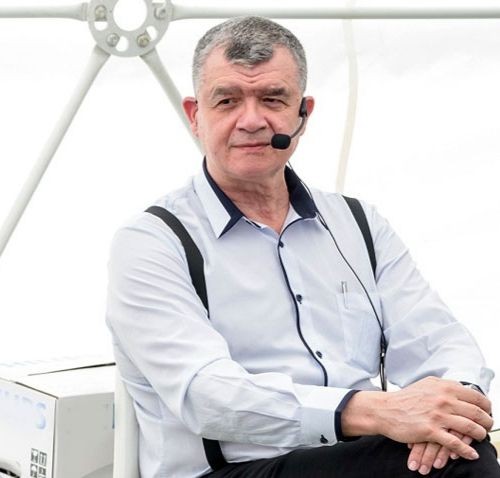A device as big as a telephone receiver can detect the presence of Covid-19 even before the virus could be detected by a PCR. It has been developed by a team of Italian, Spanish and Bulgarian scientists and is already used in diagnosing and tracking the infection.
Eight exhalations into the device are sufficient to conclude whether inflammation has occurred in the airways. In this way, the temperature of the lungs can be measured and а newly emerged infection can be caught early. With a coronavirus infection, like the flu, the temperature is thought to rise before clinical symptoms appear.
“It is a device that we can conditionally call a thermometer for the lungs”, explains Prof. Todor Popov from the Saint Ivan Rilski University Multi-Profile Hospital, a leading scientist in the international project. “In principle, there are various types of thermometers and they give us an idea of whether there is any inflammation in the body. However, when we measure the temperature of the exhaled air, we get information not only about the general temperature of the body, but also about the condition of the respiratory system and how much inflammation there is in it.”
The device is designed for patients with asthma, because the disease causes inflammation of the respiratory tract and therefore the temperature rises. And since a similar process takes place with a Covid-19 infection, the international team decided to use the already licensed equipment to monitor the dynamics of the temperature. This is done not only in Italy and Spain, where there are many more patients, but also in Bulgaria.
In Bulgaria, first the so-called thermometers were given out to people in contact with coronavirus patients. With the help of these devices, they measure their temperature in the morning and evening, and the values are automatically registered on a special website and it is monitored whether an infection will develop in their lungs.
 “Here we are talking about telemedicine, about remote measurement of the most modern type”, says Prof. Todor Popov. “In this way the patient does not come into contact with another person and avoids infecting them, and we understand how the infection progresses and try to track it over time. When did the temperature of the exhaled air start to rise, when did the symptoms appear – things that are important from the point of view of disease control.”
“Here we are talking about telemedicine, about remote measurement of the most modern type”, says Prof. Todor Popov. “In this way the patient does not come into contact with another person and avoids infecting them, and we understand how the infection progresses and try to track it over time. When did the temperature of the exhaled air start to rise, when did the symptoms appear – things that are important from the point of view of disease control.”
In the opinion of Prof. Todor Popov, the coronavirus epidemic in Bulgaria is subsiding, but whether this will be a lasting trend and a new wave will not follow, no one can predict.
"Talking about things that we still do not understand, in what way they will manifest themselves, apart from being irresponsible, is also a sign of excessive self-confidence”, adds Prof. Todor Popov. “I personally do not attempt to make guesses about something different from our previous experience. In the absence of sufficient other information, precautions are the only way in which we can limit the infection. The coronavirus undergoes changes over time and is certainly affected by the season. This is something new for all of us. ”
English Rossitsa Petcova
Photos: BNT and libraryOn 27 October, the first meeting of Action CA-24150 “Values in Turbulent Times: Navigating Social Change and Challenges (VISTA)” took place in Brussels. The initiative is part of the European Cooperation in Science and Technology (COST) programme – one of..
The so-called Seal of Biliteracy was created in 2011 in the US state of California with the idea that in the conditions of a globalized economy and relationships, it is not possible for a person to develop their full potential by..
Fertility Europe , the pan-European organization that represents patient associations focused on infertility issues, has announced the start of the 9 th European Fertility Week 2025, 3-9 November. The campaign is taking place throughout Europe..
The diplomas from the 11th master class in radio journalism of the Bulgarian National Radio – BNR Academy were awarded at a solemn ceremony on November..
The first museum of investment gold is welcoming visitors in Plovdiv who want to learn more about the history of money and its connection to gold – from..
On 16 November, we celebrate Caritas Day, when we honour the Catholic Church’s charity organisation that brings hope to those in need through care and..

+359 2 9336 661
